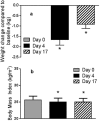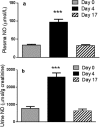Health benefit of vegetable/fruit juice-based diet: Role of microbiome
- PMID: 28526852
- PMCID: PMC5438379
- DOI: 10.1038/s41598-017-02200-6
Health benefit of vegetable/fruit juice-based diet: Role of microbiome
Abstract
The gut microbiota is an important contributor to human health. Vegetable/fruit juices provide polyphenols, oligosaccharides, fiber and nitrate (beet juice), which may induce a prebiotic-like effect. Juice-based diets are becoming popular. However, there is a lack of scientific evidence of their health benefits. It was our hypothesis that changes in the intestinal microbiota induced by a juice-based diet play an important role in their health benefits. Twenty healthy adults consumed only vegetable/fruit juices for 3 days followed by 14 days of customary diet. On day 4 we observed a significant decrease in weight and body mass index (p = 2.0E-05), which was maintained until day 17 (p = 3.0E-04). On day 4 the proportion of the phylum Firmicutes and Proteobacteria in stool was significantly decreased and Bacteroidetes and Cyanobacteria was increased compared to baseline and was partially reversed on day 17. On day 4 plasma and urine nitric oxide was increased by 244 ± 89% and 450 ± 360%, respectively, and urinary lipid peroxidation marker malondialdehyde was decreased by 32 ± 21% compared to baseline. General well-being score was increased at the end of the study. In summary a 3-day juice-based diet altered the intestinal microbiota associated with weight loss, increase in the vasodilator NO, and decrease in lipid oxidation.
Conflict of interest statement
The authors declare that they have no competing interests.
Figures





Similar articles
-
Effects of Vegetable and Fruit Juicing on Gut and Oral Microbiome Composition.Nutrients. 2025 Jan 27;17(3):458. doi: 10.3390/nu17030458. Nutrients. 2025. PMID: 39940316 Free PMC article.
-
Glutathione S-transferase M1 and T1 gene polymorphisms with consumption of high fruit-juice and vegetable diet affect antioxidant capacity in healthy adults.Nutrition. 2013 Jul-Aug;29(7-8):965-71. doi: 10.1016/j.nut.2012.12.025. Epub 2013 Feb 16. Nutrition. 2013. PMID: 23422534
-
Four week supplementation with mixed fruit and vegetable juice concentrates increased protective serum antioxidants and folate and decreased plasma homocysteine in Japanese subjects.Asia Pac J Clin Nutr. 2007;16(3):411-21. Asia Pac J Clin Nutr. 2007. PMID: 17704021 Clinical Trial.
-
Role of fruit juice in achieving the 5-a-day recommendation for fruit and vegetable intake.Nutr Rev. 2019 Nov 1;77(11):829-843. doi: 10.1093/nutrit/nuz031. Nutr Rev. 2019. PMID: 31504822 Free PMC article. Review.
-
Effects and Mechanisms of Fruit and Vegetable Juices on Cardiovascular Diseases.Int J Mol Sci. 2017 Mar 4;18(3):555. doi: 10.3390/ijms18030555. Int J Mol Sci. 2017. PMID: 28273863 Free PMC article. Review.
Cited by
-
Nitrate Metabolism and Ischemic Cerebrovascular Disease: A Narrative Review.Front Neurol. 2022 Mar 3;13:735181. doi: 10.3389/fneur.2022.735181. eCollection 2022. Front Neurol. 2022. PMID: 35309590 Free PMC article. Review.
-
Polyphenol Health Effects on Cardiovascular and Neurodegenerative Disorders: A Review and Meta-Analysis.Int J Mol Sci. 2019 Jan 16;20(2):351. doi: 10.3390/ijms20020351. Int J Mol Sci. 2019. PMID: 30654461 Free PMC article. Review.
-
Fruit-Based Diet and Gut Health: A Review.Food Sci Nutr. 2025 Apr 30;13(5):e70159. doi: 10.1002/fsn3.70159. eCollection 2025 May. Food Sci Nutr. 2025. PMID: 40313793 Free PMC article. Review.
-
Are all sugars equal? Role of the food source in physiological responses to sugars with an emphasis on fruit and fruit juice.Eur J Nutr. 2024 Aug;63(5):1435-1451. doi: 10.1007/s00394-024-03365-3. Epub 2024 Mar 16. Eur J Nutr. 2024. PMID: 38492022 Free PMC article. Review.
-
Can diet modulate trimethylamine N-oxide (TMAO) production? What do we know so far?Eur J Nutr. 2021 Oct;60(7):3567-3584. doi: 10.1007/s00394-021-02491-6. Epub 2021 Feb 3. Eur J Nutr. 2021. PMID: 33533968 Review.
References
-
- Tome-Carneiro, J. & Visioli, F. Polyphenol-based nutraceuticals for the prevention and treatment of cardiovascular disease: Review of human evidence. Phytomedicine: international journal of phytotherapy and phytopharmacology, doi:10.1016/j.phymed.2015.10.018 (2015). - PubMed
-
- Dahl, W. J. et al. Health Benefits of Fiber Fermentation. Journal of the American College of Nutrition 1–10, doi:10.1080/07315724.2016.1188737 (2017). - PubMed
Publication types
MeSH terms
Substances
LinkOut - more resources
Full Text Sources
Other Literature Sources

